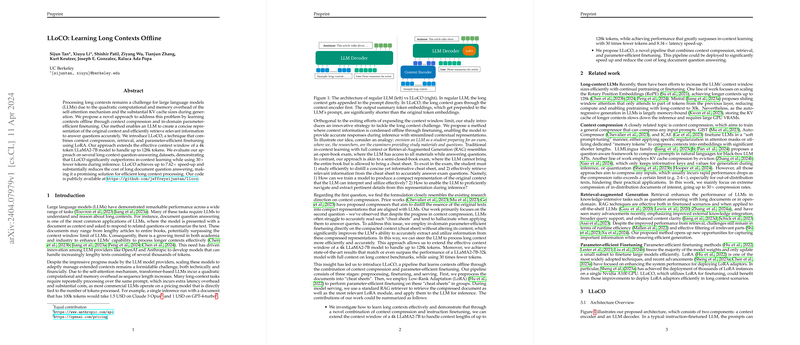Extending LLMs' Capacity for Long-Context Tasks via LLoCO
Introduction to LLoCO
The continual growth of LLMs has heralded significant advancements in understanding and generating human-like text. These models hold particular promise for tasks requiring comprehension of extensive documents, such as long document question answering (QA). However, the native limitations of LLMs, marked by their inability to process lengthy texts beyond a few thousand tokens due to quadratic computational overheads, have posed noteworthy challenges. Addressing this, a paper introduces LLoCO (Learning Long Contexts Offline), a novel pipeline designed to significantly extend the effective context window of LLMs, specifically demonstrated on a LLaMA2-7B model.
LLoCO's Approach to Long-Context Processing
LLoCO's methodology is underpinned by three core strategies: context compression, retrieval, and parameter-efficient finetuning. Here's a detailed breakdown of how each component contributes to the pipeline:
- Context Compression: The approach begins by encoding extensive texts into denser, more manageable representations. This compression is achieved through a context encoder, which processes the original context and produces a set of summary embeddings that encapsulate the key information in a much-reduced form.
- Retrieval Mechanism: Useful for long-context QA, this facet involves retrieving compressed document representations pertinent to the user's query. It highlights LLoCO's ability to efficiently navigate and leverage concise context representations during the inference phase.
- Parameter-Efficient Finetuning: Post-compression, LLoCO employs Low-Rank Adaptation (LoRA) to finetune the model in a manner that's both effective and frugal in parameter adjustments. This step is crucial for refining the model's ability to accurately interpret and utilize the compressed contexts.
The combination of these strategies enables LLaMA2-7B to manage up to 128k tokens effectively, a considerable leap from its original 4k token window. Notably, LLoCO achieves this extension while significantly outclassing in-context learning efficiency, using fewer tokens during inference.
Empirical Results
The paper presents a compelling empirical evaluation across several long-context QA datasets. When applied to LLaMA2-7B, LLoCO consistently delivered superior performance, markedly surpassing the baseline performances of models without context and those utilizing traditional in-context learning or retrieval-based methods. Specifically, for the NarrativeQA dataset, LLoCO demonstrated an impressive ability to handle contexts averaging 84,770 tokens, achieving high F1 scores by compressing these contexts into roughly 2,600 tokens.
Theoretical and Practical Implications
LLoCO's innovative approach opens new avenues for enhancing LLMs' performance on long-context tasks. Theoretically, it provides a novel framework that decouples the model's comprehension capacity from the traditionally linear constraints posed by context length. This paves the way for future research into more efficient and effective context processing methods. Practically, the demonstrated ability to significantly speed up inference while reducing computational costs has extensive implications for deploying LLMs in real-world applications where long-context processing is essential.
Future Directions
While LLoCO marks a significant step forward, the paper also acknowledges the scope for further enhancements. Future research might explore optimizing context compression techniques to improve the quality and efficiency of compressed representations. Additionally, advancing parameter-efficient finetuning methods could further refine the models' ability to extract and leverage knowledge from compressed contexts. Lastly, integrating LLoCO with emerging LLM architectures could unlock synergies, amplifying their long-context processing capabilities.
Conclusion
In summary, LLoCO presents a robust and efficient solution to the persistent challenge of long-context processing in LLMs. By marrying context compression with intelligent retrieval and finetuning strategies, it not only extends the effective context window of existing models but also sets a benchmark for future innovations in the field of generative AI and LLMs. The open-source availability of LLoCO's codebase invites the wider research community to build upon, refine, and extend its capabilities, promising exciting developments ahead in the domain of long-context comprehension.
